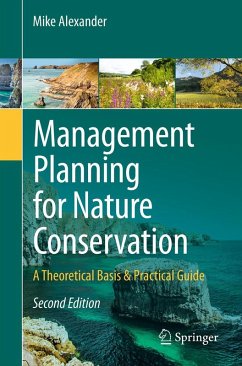Mike Alexander has long been at the forefront of developing management planning for conservation, with experience ranging from Uganda to Estonia, and from Costa Rica to Wales. He is the General Secretary of the Conservation Management System Consortium, a group of organisations with a common aim of raising standards and developing best practice in conservation management and planning. In 2012 Mike Alexander was elected a Fellow of the Society of Biology in recognition of his contribution to nature conservation and in particular management planning.
This book has drawn on the experiences and expertise of the CMS consortium and other leaders in both conservation research and wildlife management from around the world. It is essential reading for professional conservation managers and any student studying management planning for conservation within a range of degree and postgraduate courses.
Dieser Download kann aus rechtlichen Gründen nur mit Rechnungsadresse in A, B, BG, CY, CZ, D, DK, EW, E, FIN, F, GR, HR, H, IRL, I, LT, L, LR, M, NL, PL, P, R, S, SLO, SK ausgeliefert werden.
"This book is essential for nature conservation planners and managers from academia and various governmental and private agencies. Summing Up: Highly recommended. Upper-division undergraduates through professionals/practitioners." (R. L. Smith, Choice, Vol. 51 (8), April, 2014)
"I was very happy to recommend this book to my undergraduate and postgraduate students as soon as I obtained a copy. This is a hands-on book, and offers an informative outline of what management planning for conservation entails in practice, including how to develop an action plan, which is a skill that standard academic texts seldom provide. One striking aspect of the book is its logical structure, and plain but authoritative tone." (Munir Morad, International Journal of Environmental Studies, Vol. 66 (3), 2009)









